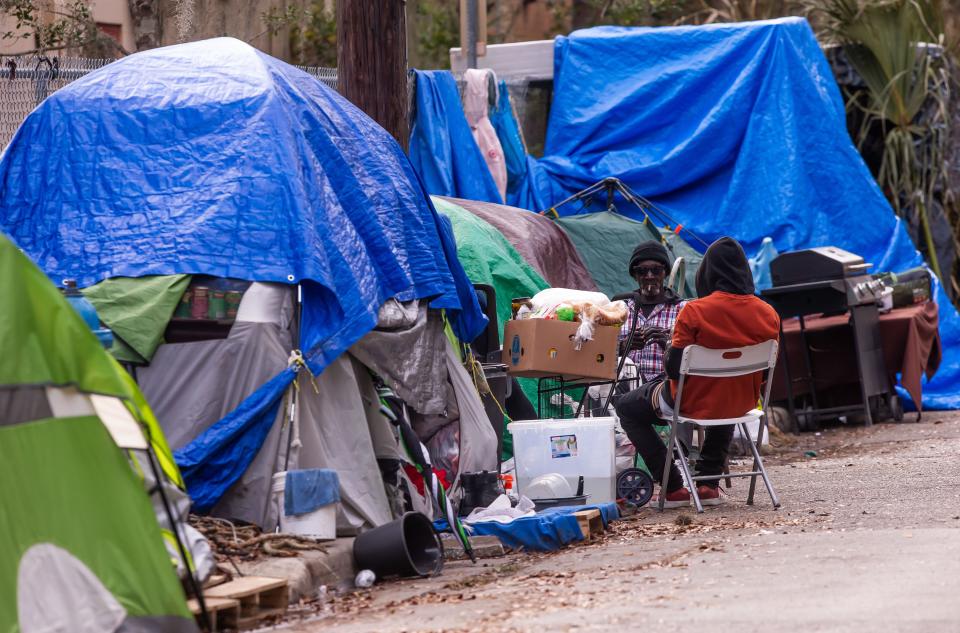Gainesville Democrat only legislator to break party lines for vote on anti-public camping bill
- Oops!Something went wrong.Please try again later.
Florida Rep. Yvonne Hayes Hinson, a Democrat representing District 21, was the only legislator in the Florida House or Senate to break party lines for a vote on a new state law that could force Gainesville to forbid people from sleeping on public property.
The anti-public camping bill, heralded mostly by state Republicans and Gov. Ron DeSantis, will prohibit municipalities from allowing camping on public property. Instead, municipalities are required to provide a designated specific public space for camping along with mental health resources, bathrooms and security.
Proponents of the legislation see it as a way to ensure homeless people have the resources needed to “get back on their feet,” while creating cleaner and safer streets. Critics say the law, which goes into effect Oct. 1, unfairly targets and harms a vulnerable population.
Hinson, who voted outside party lines in favor of the law, said a designated encampment with resources is a better alternative to sleeping outside with no power or facilities.
“An encampment is better than what we're seeing here in Gainesville — people sleeping on the street, taking over the street, no sanitation, no running water, no power. This will at least give them a place that is being monitored,” she said. “I couldn't turn a blind eye to what we've got. We've got a great brick-and-mortar shelter, we've had an encampment that didn't satisfy all of our needs, and in spite of all that we still have public sleeping.”

More: New Florida law may force Gainesville to forbid sleeping and camping on public property
More: Alachua County homeless service providers at risk of losing significant funding
Hinson said she tried working with the bill’s sponsor to create a free housing plan while the bill was still in committee, but they couldn’t reach an agreement. Initially voting against the bill during the committee vote, she changed her mind by the final vote.
“I had to vote yes,” Hinson said, “because even what they're doing is better than what we have.”
However, some homelessness experts in the area disagree.
“We have decades of evidence that shows that tickets and jails don't do anything to get people off of the street,” said Jon DeCarmine, executive director of Grace Marketplace. “I don't expect this bill to have any positive impact on vulnerable people who are on the streets. To the contrary, it is very likely to make both their lives more difficult and life more difficult for the communities that are now trying to interpret this law in some way.”
Florida’s law, notably, will not ticket unhoused people, but rather the municipalities for allowing them to sleep in undesignated public areas.
It’s no secret that homelessness is a problem in Gainesville and across many communities in the state. In February, Gainesville officials largely cleared out a homeless encampment on Southeast Fourth Place, tagging peoples’ belongings with notices that they needed to move from public right-of-ways or their property would be removed by city staff.
At the time, city staff was able to ask people to move from sidewalks and roads, but not other public areas. This new law, however, would have forced them to do so.
“The issue that pops up most often is when people can't or won't come into shelter,” DeCarmine said. “Then we need to start looking at other arrangements like street outreach services, direct housing placements, or any other opportunities to get somebody off the street and into housing.”
Gainesville Mayor Harvey Ward told The Gainesville Sun earlier in April that he finds the bill unclear, and that it makes broad statements and assumptions.
Some points of uncertainty Ward pointed out are the extent to which the county will be involved, and the fact that these designated camping sites will not allow drugs or alcohol despite the prevalence of them among chronically unhoused people with mental health conditions.
He said he hopes to get clarity soon on the questions he finds unanswered in the law and doesn’t believe the bill’s creators have any ill intent.
Hinson said that although many of her colleagues tried to get her to change her vote, she sees the situation differently than them.
“I believe I see it differently, and I've said this in all committees, that I've had to address the homeless problem at my city level. I've had to see it in the flesh. I've worked with it intimately… and I've just seen it too much [to turn] away from it,” she said. “It's happening in a big way and we have to do something about it. We can't just write it off.”
This article originally appeared on The Gainesville Sun: Gainesville Democrat breaks party lines for vote anti-public camping

